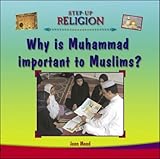
Price: £12.99
Publisher: Dispatch same day for order received before 12 noonGuaranteed packagingNo quibbles returns
Genre: Non Fiction
Age Range: 8-10 Junior/Middle
Length: 32pp
Buy the Book
Why is Muhammad important to Muslims?
Review also includes:
How and why do Hindus and Sikhs celebrate Divali?, 978-0237534127
Why is Muhammad important to Muslims?explores the life of Muhammad from his birth to death and examines various aspects of his personality, thoughts, character, belief and actions including the events in his life as they influenced him. Muhammad had a profound impact on people around him as it was through him and his actions that Islam was revealed to Muslims.
This book is written for pupils at Key stage two in order to support and extend their learning objectives including promoting a deeper understanding of this religion to help develop a healthy appreciation for differing faiths. All facets of Islam are discussed in the book in order to enable the pupil to choose information according to their curriculum requirements.
Helpful suggestions for teachers and parents are also given together with a full glossary and index. Photographs are used throughout.
How and why do Hindus and Sikhs celebrate Divali?is another title in the ‘Step-up Religion’ series written to encourage a deeper understanding of world religions amongst the younger generation. It is also aimed at Key Stage two to support the learning objectives of the religious education scheme of work curriculum.
The text provides information about Divali, the festival of light, a Hindu festival celebrated in India for centuries. This festival is also celebrated by the followers of a different and much younger religion, Sikhism. The book first examines in detail all the aspects of Divali including the basic story, the deities worshipped and traditions and customs observed. It then discusses the significance of light and draws on other religions to broaden pupils’ perception of other faiths.
Regarding why and how Sikhs celebrate Divali, the book briefly examines the religion and then provides a historical perspective to this tradition. The sixth Guru, Guru Har Gobind, was imprisoned for a considerable length of time and finally released on Divali in 1619. Sikhs illuminated the Golden Temple to welcome him. Since then Sikhs have joined Hindus in celebrating Divali but follow their own separate beliefs and practices along with some of the common traditions already established.
Divali is a colourful festival and the illustrations in the book mirror this. Extensive notes for teachers and parents are given with a comprehensive glossary and index.



